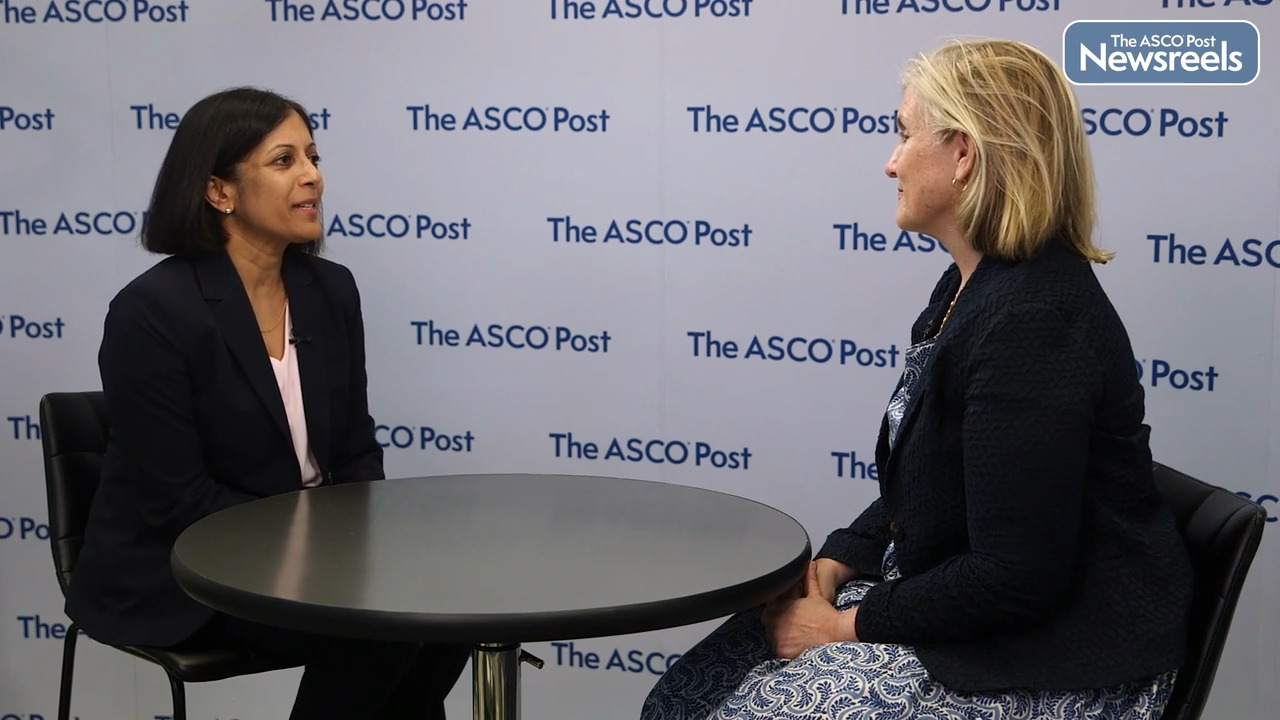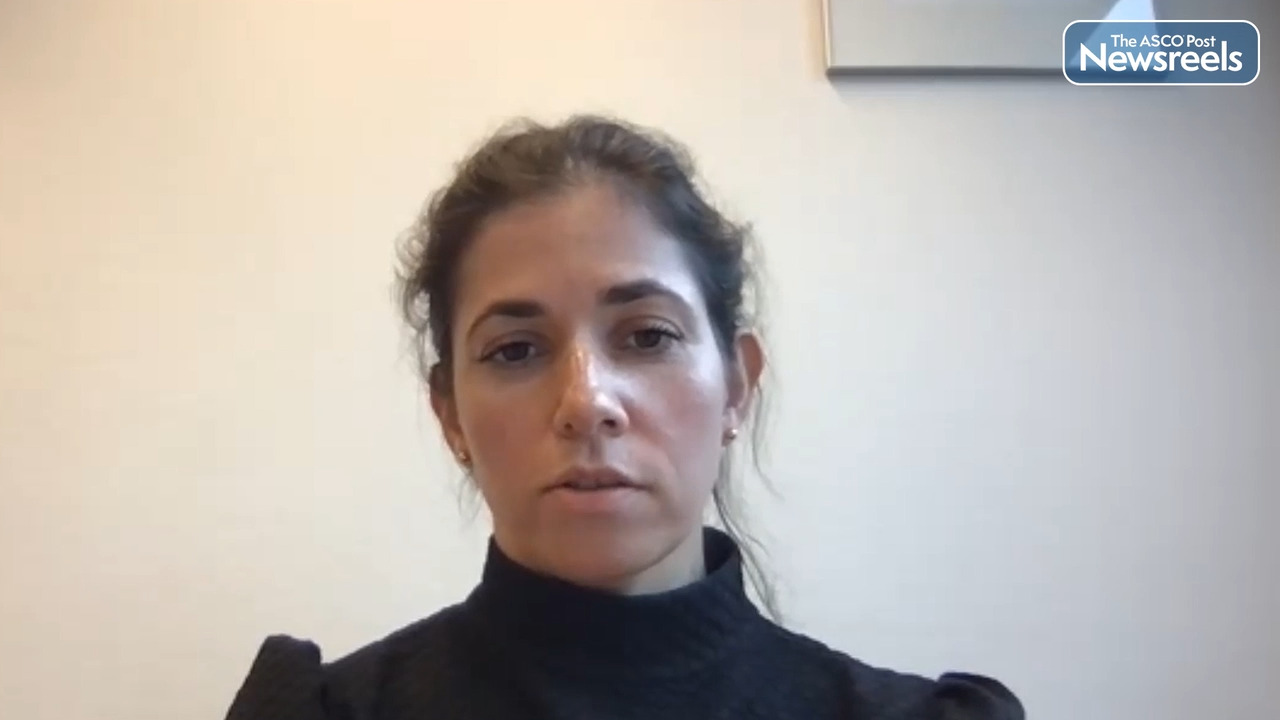Retrospective Study Finds Black Patients With Colorectal Cancer Had Fewer Actionable Genomic Mutations Than White Patients
Black individuals have a higher incidence of colorectal cancer than White individuals, and their outcomes are worse. Undoubtedly, reasons for this are multifaceted, but the disparity in outcomes may be partly explained by genomic differences, documented in a large retrospective study presented at...
Effect of Upregulated KDM5D Gene on Y Chromosome in Male Patients With KRAS-Mutated Colorectal Cancer
Researchers have revealed that the KDM5D gene on the Y chromosome, which is upregulated in KRAS-mutated colorectal cancer, may be responsible for increasing tumor cell invasiveness and reducing antitumor immunity in male patients, according to a recent study published by Li et al in Nature. The new ...
Patients With Refractory Metastatic Colorectal Cancer May Experience Survival Benefits With Fruquintinib
Targeted therapy with fruquintinib may improve overall survival and progression-free survival in patients with refractory metastatic colorectal cancer, according to a novel study published by Dasari et al in The Lancet. Background According to the American Cancer Society, colorectal cancer is the...
Patient-Reported Outcomes From the PROSPECT Trial: Neoadjuvant FOLFOX vs Chemoradiation for Locally Advanced Rectal Cancer
In an analysis from the PROSPECT trial (Alliance N1048) reported in the Journal of Clinical Oncology, Ethan Basch, MD, MSc, FASCO, and colleagues identified patient-reported outcome patterns among those receiving neoadjuvant FOLFOX (fluorouracil, leucovorin, oxaliplatin) or pelvic chemoradiation...
Longitudinal ctDNA Methylation Status and Risk of Recurrence After Surgery in Patients With Stage I to III Colorectal Cancer
In a Chinese study reported in JAMA Oncology, Mo et al found that longitudinal measurement of circulating tumor DNA (ctDNA) methylation permitted early detection of disease recurrence in patients undergoing surgery for stage I to III colorectal cancer. Study Details In the prospective cohort...
Impact of Historic Redlining Practices on Cancer Screening Rates
Although redlining was outlawed more than 50 years ago, individuals who currently live in historically redlined areas may be less likely to be screened for breast cancer, colorectal cancer, and cervical cancer than individuals who live in areas not associated with redlining practices, according to...
Cathy Eng, MD, and Thejus Jayakrishnan, MD, on Colorectal Cancer: Metabolomic Differences in Young-Onset vs Average-Onset Disease
Cathy Eng, MD, of Vanderbilt-Ingram Cancer Center, and Thejus Jayakrishnan, MD, of the Cleveland Clinic Taussig Cancer Institute, discuss significant differences in the citrate cycle, a core pathway of cellular metabolism associated with colorectal cancer. Metabolomic differences impacted by environmental exposures (arginine biosynthesis and dietary red meat) were also noted, suggesting possible links with younger age of onset in this disease (Abstract 3510).
Smitha Krishnamurthi, MD, and Deb Schrag, MD, MPH, on Rectal Cancer: New Findings on Chemoradiation, Chemotherapy, and Excision
Smitha Krishnamurthi, MD, of the Cleveland Clinic, and Deb Schrag, MD, MPH, of Memorial Sloan Kettering Cancer Center, discuss phase III findings from the PROSPECT trial, which showed FOLFOX chemotherapy with selective use of radiation therapy and sensitizing fluoropyrimidine (5FUCRT) is noninferior to 5FUCRT for the neoadjuvant treatment of patients with locally advanced rectal cancer, prior to low anterior resection with total mesorectal excision (Abstract LBA2).
Cathy Eng, MD, and Lars Henrik Jensen, MD, PhD, on Locally Advanced Colon Cancer: Efficacy of Neoadjuvant Chemotherapy and Standard Treatment
Cathy Eng, MD, of Vanderbilt-Ingram Cancer Center, and Lars Henrik Jensen, MD, PhD, of the Danish Colorectal Cancer Center South and the University Hospital of Southern Denmark, discuss phase III results from the Scandinavian NeoCol trial, which showed that neoadjuvant chemotherapy is not superior to standard upfront surgery in terms of disease-free and overall survival in patients with colon cancer, although there are certain circumstances when this approach may have more favorable outcomes (Abstract LBA3503).
Transcriptional Profiling May Provide Clues to Treating Colorectal Cancer More Effectively in Younger Patients
A novel study is shedding light on factors that may affect treatment response in patients with young-onset colorectal cancer. Researchers uncovered differences in transcriptional metabolic profiles and other drivers of disease, as well as immune profiles, between younger and older patients with...
Radiation May Be Safely Omitted in Select Patients With Locally Advanced Rectal Cancer
Patients with locally advanced rectal cancer with tumors that respond to chemotherapy may safely forgo radiation therapy before surgery, based on the findings of the PROSPECT trial. These data were presented by Deborah Schrag, MD, FASCO, MPH, at the 2023 ASCO Annual Meeting (Abstract LBA2) and...
Thierry Conroy, MD, on Rectal Cancer: Long-Term Results on mFOLFIRINOX vs Preoperative Chemoradiation Therapy
Thierry Conroy, MD, of the Institut de Cancérologie de Lorraine, discusses phase III findings from the PRODIGE 23 trial, showing that neoadjuvant chemotherapy with mFOLFIRINOX followed by chemoradiotherapy, surgery, and adjuvant chemotherapy improved all outcomes, including overall survival, in patients with locally advanced rectal cancer compared with standard chemoradiotherapy, surgery, and adjuvant chemotherapy (Abstract LBA3504).
Sebastian Stintzing, MD, on Colorectal Cancer: Influence of Liquid Biopsy in First-Line Combination Treatment
Sebastian Stintzing, MD, of the Charité Universitätsmedizin Berlin, discusses results from the phase III FIRE-4 study, which showed that liquid biopsy is clinically relevant in verifying mutational status in patients with metastatic colorectal cancer and is efficacious in first-line treatment of FOLFIRI and cetuximab for patients with RAS wild-type disease (Abstract 3507).
Study Finds Wide Variations in Intratumoral Microbiome of Patients With Early- vs Late-Onset Colorectal Cancer
Researchers have found that the bacteria, fungi, and viruses within the tumors of patients with colorectal cancer varied significantly depending on whether they were diagnosed with early-onset or late-onset disease, according to new findings presented by Weinberg et al at the 2023 ASCO Annual...
Incidence of Colorectal, Lung, and Breast Cancers May Be Rising Due to COVID-19–Related Screening Delays
Delays in cancer screenings during the COVID-19 pandemic may have resulted in lower reported incidences of colorectal, lung, and breast cancers, reflecting potentially high rates of undiagnosed cancer and later-stage diagnoses, according to a new study published by Romatoski et al in the Journal of ...
Addition of Panitumumab to Trifluridine/Tipiracil in Anti-EGFR Treatment Rechallenge in Refractory RAS Wild-Type Metastatic Colorectal Cancer
In the Italian phase II VELO trial reported in JAMA Oncology, Napolitano et al found that anti-EGFR treatment rechallenge with the addition of panitumumab to trifluridine/tipiracil improved progression-free survival in the third-line setting for patients with RAS wild-type metastatic colorectal...
Association Between Overweight/Obesity and Risk of Gastrointestinal Cancer
Researchers have found that individuals in early and middle adulthood who have a body mass index (BMI) indicating that they have overweight or obesity may be at an increased risk of developing gastrointestinal cancer, according to a new study published by Loomans-Kropp and Umar in JAMA Network...
Addition of Bevacizumab to Trifluridine/Tipiracil in Refractory Metastatic Colorectal Cancer
As reported in The New England Journal of Medicine by Prager et al, the phase III SUNLIGHT trial has shown prolonged overall survival with the addition of bevacizumab to trifluridine/tipiracil (FTD-TPI) in previously treated patients with metastatic colorectal cancer. As stated by the...
Potential Utility of Polygenic Risk Scores in Cancer Screening in the United Kingdom
In a modeling study reported in The Lancet Oncology, Huntley et al found that the extension of UK cancer screening programs for breast, prostate, and colorectal cancers to a polygenic risk score (PRS)-defined high-risk group of patients with cancer may improve cancer case detection and avoidance of ...
Tucatinib Plus Trastuzumab in HER2-Positive, Refractory, RAS Wild-Type, Unresectable or Metastatic Colorectal Cancer
As reported in The Lancet Oncology by John H. Strickler, MD, and colleagues, the phase II MOUNTAINEER trial has shown the activity of the combination of tucatinib plus trastuzumab in patients with HER2-positive, chemotherapy-refractory, RAS wild-type, unresectable or metastatic colorectal cancer....
Three New Studies Unveil Recent Developments in the Screening and Treatment of Biliary Tract Cancer and Colorectal Cancer
Researchers have revealed the impacts of several new developments in screening and treating patients with biliary tract cancer and colorectal cancer—including the development of patient-derived organoids to test chemotherapy response, the use of nonsteroidal anti-inflammatory drugs (NSAIDs) to...
Birth by Cesarean Delivery and Development of Early-Onset Colorectal Cancer
In a Swedish study reported in JAMA Network Open, Cao et al found that females born via cesarean delivery were at an increased risk of early-onset colorectal cancer vs those born via vaginal delivery. No increased risk was observed among males born via cesarean delivery. As noted by the...
Risk of Early-Onset Digestive Tract Cancers Among Young Adults With Nonalcoholic Fatty Liver Disease
In a Korean nationwide cohort study reported in the Journal of Clinical Oncology, Park et al found that individuals aged 20 to 39 years with nonalcoholic fatty liver disease (NAFLD) were at an increased risk of developing early-onset digestive tract cancers. Study Details The study included data on ...
Newly Identified Risk Factors May Point to a Heightened Risk for Early-Onset Colorectal Cancer Among Younger Adult Patients
Researchers have identified four warning signs and symptoms that may indicate an elevated risk of early-onset colorectal cancer, according to a new study published by Fritz et al in the Journal of the National Cancer Institute. The findings may be key to helping physicians more effectively detect...
Lifestyle Habits, Risk Factors, and Cancer Screening During COVID-19 Pandemic
Investigators discovered both favorable and unfavorable changes in major cancer risk factors, preventive behaviors and services, and screenings in the United States during the COVID-19 pandemic, according to a new study published by Star et al in Cancer Epidemiology, Biomarkers & Prevention....
Lindsay L. Peterson, MD, on Exercise and Cancer Outcomes
Lindsay L. Peterson, MD, of the Washington University, St. Louis, discusses the value of physical activity in improving cancer prognosis, especially for patients with breast or colon cancer. Aerobic exercises and resistance training are recommended during and after treatment. Exercise may help inhibit tumor growth, improve quality of life by decreasing fatigue and anxiety, build muscle mass, increase physical function, and reduce surgical complications and treatment delays.
Whole-Exome Sequencing May Help Identify Individuals With Cancer Predisposition Syndromes Missed by Current Screening Guidelines
Researchers revealed that 39.2% of patients who consented to whole-exome sequencing and were identified as carriers of predisposition genes for hereditary breast and ovarian cancer or Lynch syndrome did not qualify for genetic screening under current guidelines, according to new findings presented...
Study Explores Genomic Basis of Racial Disparities Among Patients With Colorectal Cancer
Black individuals are disproportionately affected by colorectal cancer. They have the highest rates of the disease of any racial or ethnic group in the United States, and are about 20% more likely to develop colorectal cancer and about 40% more likely to die of the disease than most other groups. A ...
Consensus Molecular Subtypes as Markers for Maintenance Therapy Regimens for RAS Wild-Type Metastatic Colorectal Cancer
In an analysis of the German phase II PanaMa trial reported in the Journal of Clinical Oncology, Stahler et al evaluated consensus molecular subtypes as prognostic and predictive biomarkers in patients with RAS wild-type metastatic colorectal cancer receiving fluorouracil and leucovorin with or...
Financial Toxicity of Cancer May Impact Partner’s Quality of Life
Researchers have discovered that the financial impact of an individual’s cancer diagnosis may also impact a partner’s health-related quality of life, according to a new study published by Ghazal et al in JAMA Network Open. “When you think of key developmental milestones young adults expect to...
Mortality After Colonoscopy-Detected vs Postcolonoscopy-Diagnosed Colorectal Cancer in the VA Health-Care System
In a study reported in JAMA Network Open, Kahi et al found no differences in all-cause or cancer-specific mortality among veterans in the Veterans Affairs (VA) health-care system with colonoscopy-detected colorectal cancer vs those with postcolonoscopy-diagnosed colorectal cancer. Study Details...
Midhun Malla, MD, on Metastatic Colorectal Cancer: Treatment Updates
Midhun Malla, MD, of the West Virginia University Cancer Institute, discusses the molecular landscape of metastatic colorectal cancer and the development and approvals of targeted treatments. Dr. Malla also details the range of HER2-targeted therapeutic options and the approval of trastuzumab and tucatinib for HER2-amplified disease in the second-line setting or after. In addition, he discusses emerging therapies in refractory metastatic colorectal cancers followed by circulating tumor DNA–guided management of oligometastatic colorectal cancers using immune checkpoint inhibitors.
Poorer Survival in Stage III Colon Cancer With Greater Inflammation After Surgery and Prior to Adjuvant Therapy
In a study reported in JAMA Oncology, En Cheng, MD, PhD, of Kaiser Permanente Northern California, Jeffrey Meyerhardt, MD, MPH, FASCO, of Dana-Farber Cancer Institute, and colleagues found that higher levels of inflammatory biomarkers measured after surgery but before starting chemotherapy were ...
10 Facts About Colorectal Cancer From the Colorectal Cancer Alliance
March is widely recognized worldwide as Colorectal Cancer Awareness month. Several advocacy groups and professional organizations recognize Colorectal Cancer Awareness month by promoting screening for eligible individuals and working to increase awareness. Here, the Colorectal Cancer Alliance, an...
Studies of Novel Therapeutic Approaches Highlighted During Colorectal Cancer Awareness Month at Dana-Farber
Colorectal cancer is the third most common cancer among men and women of all ages in the United States and is on track to be the leading cause of cancer death in adults younger than 50 by 2030. The alarming rise of colorectal cancer in people younger than age 50 prompted the U.S. Preventive...
Colorectal Cancer Rates Are Rising in Younger Adults, Shifting to More Advanced Disease Across All Ages
According to the American Cancer Society, colorectal cancer is the third most commonly diagnosed cancer and the third most common cause of cancer-related death in both men and women in the United States. However, it ranks second in cancer-related deaths overall and is the leading cause of cancer...
Myriam Chalabi, MD, PhD, on Colon Cancer: New Findings on Neoadjuvant Immune Checkpoint Inhibition
Myriam Chalabi, MD, PhD, of The Netherlands Cancer Institute, discusses data from the NICHE-2 study, which confirms previously reported pathologic responses to short-term neoadjuvant nivolumab plus ipilimumab in patients with locally advanced mismatch repair–deficient colon cancer. Survival data suggest neoadjuvant immunotherapy may become standard of care and allow further exploration of organ-sparing approaches. (Abstract LBA7).
Study Examines Effect of Physical Activity on Recurrence in Patients Previously Treated for Colorectal Cancer
Researchers have found that postoperative physical activity was associated with improved disease-free survival among patients previously treated for stage III colorectal cancer, according to a novel study published by Brown et al in the British Journal of Sports Medicine. “With March being National ...
First-Line Therapy of Metastatic Colon Cancer
This is Part 3 of The Evolving Targeted Treatment Landscape for Colorectal Cancer, a three-part video roundtable series. Scroll down to watch the other videos from this Roundtable. In this video, Drs. John Strickler, Stacey A. Cohen, and Harshabad Singh discuss the first-line treatment of metastatic colon cancer. The patient is a 48-year-old man who presents to his primary care provider with bloody diarrhea. Colonoscopy reveals a nonobstructing sigmoid colon tumor, which pathology confirms as adenocarcinoma. CT of the chest, abdomen, and pelvis reveals a liver mass and multiple bilateral pulmonary nodules, and he is diagnosed with metastatic adenocarcinoma. His ECOG performance status score is 1, and he is started immediately on FOLFOX chemotherapy. Meanwhile, next-generation sequencing is ordered, which reveals APC and TP53 mutations, and wild-type KRAS, NRAS, and BRAF. The faculty discuss the myriad treatment options for this relatively young and fit patient with left-sided RAS wild-type metastatic colon cancer. They review the impact of tumor sidedness on decision making in the front-line setting, as well as the clinical implications of the recent phase III PARADIGM study.
BRAF V600E–Mutated Colon Cancer
This is Part 2 of The Evolving Targeted Treatment Landscape for Colorectal Cancer, a three-part video roundtable series. Scroll down to watch the other videos from this Roundtable. In this video, Drs. John Strickler, Stacey A. Cohen, and Harshabad Singh discuss the management of BRAF V600E–mutated colorectal cancer. The patient is a 40-year-old woman who presents to the ER with severe abdominal pain. CT scan of the chest, abdomen, and pelvis reveals a cecal mass with adjacent nodularity, abdominal lymphadenopathy, and multiple liver lesions consistent with metastatic disease. Colonoscopy demonstrates a nonobstructing mass in the ascending colon; pathology confirms adenocarcinoma, and biopsy of liver lesion confirms adenocarcinoma consistent with colorectal primary. Her performance status is limited due to severe abdominal pain related to her metastatic disease. The patient is started on FOLFOX plus bevacizumab, which results in an improvement in her pain and performance status. Next-generation sequencing reveals APC, SMAD4, and TP53 mutations, as well as a BRAF V600E mutation. The faculty discuss the treatment options for patients with aggressive BRAF V600E mutations, which are associated with poor prognosis and EGFR resistance, in both the first- and second-line setting. They also highlight importance of individualizing treatment based on a patient’s age, performance status, goals of treatment, and comorbidities.
HER2-Positive Metastatic Colorectal Cancer
This is Part 1 of The Evolving Targeted Treatment Landscape for Colorectal Cancer, a three-part video roundtable series. Scroll down to watch the other videos from this Roundtable. In this video, Drs. John Strickler, Stacey A. Cohen, and Harshabad Singh discuss the management of HER2-positive metastatic colorectal cancer. The patient is a 49-year-old man who presents to the ER with nausea, vomiting, and abdominal pain. A CT of the chest, abdomen, and pelvis reveals bowel obstruction, extensive hepatic metastases, and abdominal lymphadenopathy, and a partially obstructing mass in the sigmoid colon is found on colonoscopy. Next-generation sequencing is ordered, and the patient has APC and TP53 mutations, as well as an ERBB2 amplification. The faculty discuss potential next steps for a patient such as this, highlighting the role of HER2 amplification/overexpression in metastatic colorectal cancer, how the presence of brain metastases impacts treatment decisions, and treatment options for patients whose disease progresses on prior anti-HER2 therapies.
Regorafenib, Ipilimumab, and Nivolumab in Microsatellite-Stable Metastatic Colorectal Cancer
In a single-institution phase I trial reported in JAMA Oncology, Marwan Fakih, MD, and colleagues found that the combination of regorafenib, ipilimumab, and nivolumab showed evidence of activity in patients with microsatellite-stable metastatic colorectal cancer who did not have liver metastases....
Tucatinib With Trastuzumab in Previously Treated RAS Wild-Type HER2-Positive Advanced Colorectal Cancer
On January 19, 2023, tucatinib was grated accelerated approval for use in combination with trastuzumab for RAS wild-type, HER2-positive unresectable or metastatic colorectal cancer that progressed following fluoropyrimidine-, oxaliplatin-, and irinotecan-based chemotherapy.1 Supporting Efficacy...
Novel Immunotherapy Combination Shows Activity in Microsatellite-Stable Metastatic Colorectal Cancer
In heavily pretreated patients with metastatic colorectal cancer who have microsatellite-stable tumors, the novel combination of the monoclonal antibodies botensilimab and balstilimab showed clinical activity, producing durable responses and an estimated 63% overall survival rate at 12 months,...
First-Line Pembrolizumab in Older Patients With dMMR Metastatic Colorectal Cancer
In a retrospective cohort study reported in JAMA Network Open, Saberzadeh-Ardestani et al found that first-line pembrolizumab was associated with clinically significant prolongation of survival outcomes in mostly older patients with mismatch repair–deficient (dMMR) metastatic colorectal cancer....
American Cancer Society Data Show Colorectal Cancer Rates Are Rising in Younger Adults and Shifting to More Advanced Disease in People of All Ages
According to the American Cancer Society, colorectal cancer is the third most commonly diagnosed cancer and the third most common cause of cancer-related death in both men and women in the United States. However, it ranks second in cancer-related deaths overall, and is the leading cause of death in ...
Expert Point of View: Dustin Deming, MD
The invited discussant of the SUNLIGHT trial, Dustin Deming, MD, the ACI/Schwenn Family Association Professor in the Division of Hematology, Medical Oncology, and Palliative Care and Director of JD Fluno Colorectal Cancer Precision Medicine at the University of Wisconsin, Madison, said the findings ...
Addition of Bevacizumab to Trifluridine/Tipiracil: New Standard of Care in Refractory Colorectal Cancer
In the open-label phase III SUNLIGHT trial, the addition of bevacizumab to trifluridine/tipiracil, also known as TAS-102, significantly improved overall survival in patients with metastatic treatment-refractory colorectal cancer,1 according to Josep Tabernero, MD, Head of the Department of Medical...
Encorafenib, Binimetinib, and Cetuximab in Previously Untreated Patients With BRAF V600E–Mutant Metastatic Colorectal Cancer
In the phase II ANCHOR CRC trial reported in the Journal of Clinical Oncology, Eric Van Cutsem, MD, PhD, and colleagues found that the combination of encorafenib, binimetinib, and cetuximab produced an objective response in nearly half of previously untreated patients with BRAF V600E–mutant...
KRYSTAL-1 Confirms Activity of Adagrasib in KRAS G12C–Mutated Metastatic Colorectal Cancer and Highlights Need for Randomized Controlled Trials
KRAS G12C–mutated colorectal cancer represents 3% to 4% of metastatic colorectal cancers. Like other KRAS-mutated metastatic colorectal cancers, this group of patients represents a patient population with an unmet need, with limited options beyond two lines of therapy. In contrast to other KRAS...











